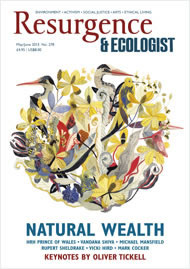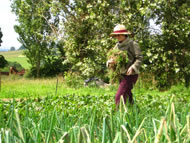When I began to write my book The Bioregional Economy I imagined that this was going to be quite a technical exercise. I had been working as a green economist for several years and so was well practised at telling people that what we wanted was a system of self-reliant local economies. This was a fairly uncontroversial and appealing message. But every now and then somebody would ask how big a local economy was, or what the boundaries of their local economy might be. My book addresses finding a response to this line of questioning.
A bioregion is a local area defined by natural rather than political boundaries: it is literally a ‘life place’ rather than a political area. But thinking bioregionally about economics – about provisioning rather than production – also forced me to think differently about my connection with my local place. Kirkpatrick Sale called his famous book about bioregionalism Dwellers in the Land, and my work has been to adopt this attitude while working on my design for systems of provisioning. I have also been guided by the approach to land of Indigenous people who still recognise their dependence on Nature and whose philosophy suggests that they belong to the land rather than the land belonging to them.
Another guiding principle in this work has been John Ruskin’s famous phrase “There is no wealth but life”. The Earth is the source of all wealth, but this has been forgotten by the many of us who shop in supermarkets and rarely visit the countryside. It is a central theme of my argument that this loss of connection has left us deeply impoverished. In spite of what the GDP figures show, we have lost the spiritual connection to our local soil, and no amount of electronic goods and exotic vegetables can replace the sense of loss this brings.
It is rather unconventional for an economist to talk about spiritual connections at all, and especially a spiritual connection to the soil. But this is, I think, the step we need to take to support our transition to a different kind of economy. The abundance of Nature and the joy that can result from intimately knowing our local place and the creatures we share it with can help us to transcend the shallow attraction of tawdry gadgets and flights to far-flung destinations.
In The Protestant Ethic and the Spirit of Capitalism, written in 1905, the early sociologist Max Weber described how the self-denying and thrifty ethic of Puritan Christianity underpinned the development of capitalism. Puritanism was also determined to deny the magic of the natural world, which it feared had survived the era of paganism and might still lurk in the Catholic Church. God was no longer to be manifest in creation but must become a wholly transcendent, other-worldly creature. Quoting Schiller, Weber called this loss of spiritual connection “the disenchantment of the world”. The external expression of this rationalist approach was the growth in bureaucracy and the scientistic and economistic worldview that dominates our modern culture.
So it was a system of myths, the Christian myths of the Protestants, that led us to view our world as concrete, material and external, and to view ourselves as cogs in a divinely inspired but not inherently divine machine. These myths have been instrumental in shaping an economy that follows this machine myth and that is increasingly divorced from the natural world. A bioregional approach to economics has the reversal of this process of objectification, disconnection and disenchantment as central to its project.








